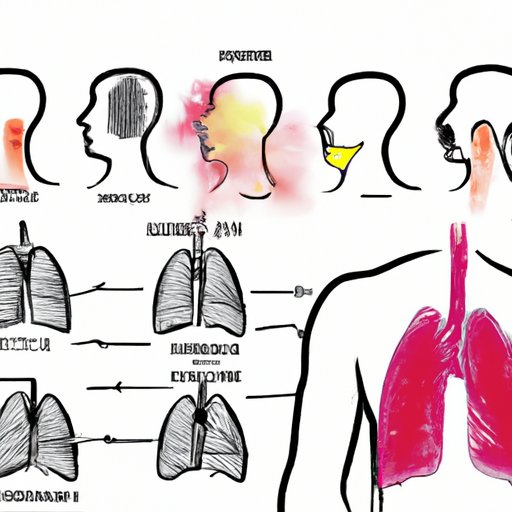Introduction
The respiratory system is a complex network of organs and tissues responsible for the exchange of oxygen and carbon dioxide between the atmosphere and the body’s cells. This process is essential for sustaining life and maintaining homeostasis in the body. The main organs of the respiratory system are the nose, mouth, pharynx, larynx, trachea, bronchi, and lungs.

Pathway of Air Through the Respiratory System
Air enters the body through the nose or mouth and travels through the nasal cavity, where it is warmed and humidified. From there, it passes through the pharynx, which serves as a passageway for both food and air. The air then moves into the larynx, which houses the vocal cords and prevents food from entering the airway. Next, the air passes through the trachea, or windpipe, which divides into two main airways known as the bronchi. The bronchi then divide into smaller branches, called bronchioles, which end in tiny air sacs called alveoli.

Role of the Lungs in the Respiratory Process
The lungs play a vital role in the respiratory process. During inhalation, oxygen is drawn into the alveoli, while carbon dioxide is expelled. This is known as gas exchange, and it takes place across the thin walls of the alveoli. Oxygen is then transported throughout the body via the bloodstream, and carbon dioxide is exhaled. In addition, the lungs are responsible for blood oxygenation, which is the process by which red blood cells pick up oxygen from the lungs and transport it to the rest of the body. The lungs also remove carbon dioxide from the body during the exhalation process.
Functions of the Respiratory System
The respiratory system has several important functions. First, it is responsible for delivering oxygen to the body’s cells. Second, it removes carbon dioxide, a waste product, from the body. Third, it helps protect the body from foreign substances, such as bacteria and viruses, by filtering out particles from inhaled air.
Diseases Affecting the Respiratory System
There are many diseases that can affect the respiratory system. Asthma is a chronic condition characterized by inflammation and narrowing of the airways, resulting in difficulty breathing. Chronic Obstructive Pulmonary Disease (COPD) is a progressive lung disease that makes it difficult to breathe. Tuberculosis is an infectious disease caused by the bacterium Mycobacterium tuberculosis. It affects the lungs and can be spread through the air when an infected person coughs or sneezes.

Impact of Pollution on the Respiratory System
Air pollution is a major environmental issue that can have serious impacts on the respiratory system. Outdoor air pollution is caused by emissions from factories, vehicles, and other sources. These pollutants can irritate the airways and lead to shortness of breath, coughing, and asthma. Indoor air pollution, such as smoke from cooking fires, can also cause respiratory problems. According to the World Health Organization, “Around 7 million people die every year from exposure to fine particles in polluted air that penetrate deep into the lungs and cardiovascular system, causing diseases including stroke, heart disease, lung cancer, chronic obstructive pulmonary diseases, and respiratory infections.”
Conclusion
The respiratory system is a complex network of organs and tissues that plays a vital role in sustaining life. Its primary functions include delivering oxygen to the body’s cells, removing carbon dioxide, and protecting the body from foreign substances. Unfortunately, air pollution can have serious impacts on the respiratory system, leading to a variety of illnesses and even death. It is important to be aware of the risks associated with air pollution and take steps to reduce its effects.
(Note: Is this article not meeting your expectations? Do you have knowledge or insights to share? Unlock new opportunities and expand your reach by joining our authors team. Click Registration to join us and share your expertise with our readers.)
